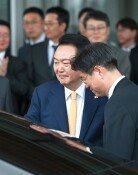A secure channel with Washington needed to respond to the North
A secure channel with Washington needed to respond to the North
Posted August. 02, 2017 07:33,
Updated August. 02, 2017 08:07
As North Korea launches intercontinental ballistic missiles targeting the U.S., more Americans believe that the U.S. needs to “act,” not words. U.S. President Donald Trump President held the second full Cabinet meeting as president, “We are gonna be able to handle them (North Korea). It will be handled. We handle everything.” He implied that tougher sanctions are imminent. U.S. diplomatic and security leaders have been making aggressive comments. Nikki Haley, U.S. ambassador to the UN, said, “Done talking about North Korea.” CIA Chief Mike Pompeo mentioned the need to oust Kim Jong Un. Former State Secretary Henry Kissinger said, “A commitment from the United States to withdraw most of its troops from the Korean Peninsula after a North Korean collapse needs to be considered to allay the Chinese fear." As such, Washington is taking North Korea’s nuclear threat seriously.
Meanwhile, it is also doubtful whether the Trump administration has power to execute what it said with an aggressive stance. The White House is said to be in a state of almost like a civil war. National Security Advisor H.R. McMaster has rumored to be dismissed for a long time and so is Secretary of State Rex Tillerson. Some say that the Department of State is not working as only two assistant secretaries of state are appointed. U.S. Special Representative for North Korea Policy Joseph Yun is the only Korea expert while assistant secretary of state for East Asia, the Department of State's Korea country desk director, and U.S. ambassador to Korea remain vacant. Some Western media argue that President Trump might have war with North Korea to make a breakthrough and there is no law that bans him from ordering war on Twitter. It is doubtful whether the Trump administration has even a single expert who can devise a North Korea policy considering future dynamics in Northeast Asia, the future of the Korea-U.S. alliance and Koreans’ safety.
As the U.S.-China rivalry is compounded by South Korea, Japan, North Korea and Russia, a new cold war order – South Korea, the U.S. and Japan versus North Korea, China and Russia – seems to take root over North Korea’s nuclear threats. For Washington’s pressure on Beijing, China’s state-run Global Times refuted, saying, “It’s a premature president’s comment.” Chinese President Xi Jinping heralded the emergence of its military power against the U.S. in a speech marking the 90th anniversary of the Chinese military. Russia expelled many U.S. diplomats and increased oil export to the North after the U.S. passed the bill to sanction Russia.
What concerns us most is whether there is a communication channel between South Korea and the U.S., which would allow us to detect such moves and have in-depth discussions when President Trump makes a decision critical to the fate of the Korean Peninsula. There is no U.S. and security expert on the National Security Council and the Ambassador to the United States remains vacant. The rumor about the August crisis not ungrounded. President Moon Jae-in should operate the South Korea-U.S. security consultative body as agreed in the summit with President Trump.







